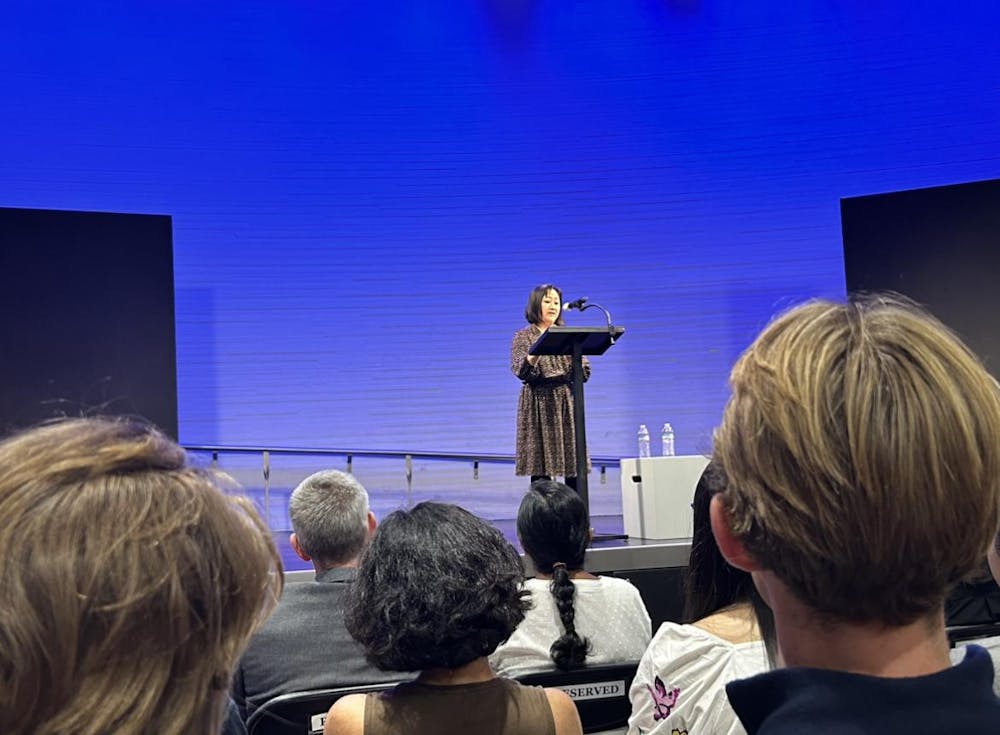In Drapkin Studio, the stage is blue-lit — the elegant performance space is empty but crackling with creative energy in preparation for the first reading of the 2023–24 Althea Ward Clark W’21 Reading Series.
The reading series, offered annually to the Princeton community, brings renowned contemporary writers into contact with students, who have a chance to both meet the writers and absorb their work. This hour-long reading featured authors Ling Ma and Sandra Cisneros. Ma is the author of the pre-COVID pandemic novel “Severance,” and the recently released “Bliss Montage,” a collection The New York Times says “peddles in the uncanny and the surreal.” Meanwhile, Cisneros is best known for her American Book Award-winning novel, “The House on Mango Street.” She read from her 2022 collection of poems entitled “Woman Without Shame.”
Around the room, students, professors, and spectators found their seats amid the invigorating spark of hushed anticipatory conversations. Then, the murmuring slowed to a silence, and Ma took the stage after a brief introduction. She read “Peking Duck,” the second to last story in “Bliss Montage,” which follows a nameless narrator. The narrator, who eventually becomes an author, recounts her childhood as an immigrant from China to Utah. Given the similar course of Ma’s own life, the story has a vaguely autobiographical tilt.
Ma read this story in its entirety, her voice even and collected in a way that sometimes seems at odds with the moments of scathingly honest commentary and dialogue between the narrator and her mother. The two quarrel throughout the course of the meal, and in one instance, they discuss the narrator’s use of her mother’s experience as a nanny in her own written work. The characters begin the meal speaking in English, a language the mother is not entirely comfortable in, before shifting to Mandarin, which conversely, the narrator is no longer fluent in. This depiction is symbolic of the impasse that the conversation builds between the two characters throughout the scene. Though the text stands alone in its tender conveyance of their inability to connect, the polished cadence of Ma’s voice stands to amplify it, granting each word heightened emotive quality.
Then, just as the “Peking Duck” story came to its conclusion, Cisneros took to the stage, bearing a large striped tote, bright pink readers, and a fan — an exuberant antithesis to Ma’s smooth poise. She read a selection of poems from “Woman Without Shame.” Although the works were all imbued with imagery of Mexico, they oscillated between free-spirited effervescence, awash with the speaker’s anecdotes of love and life in poems like “Tea Dance, Provincetown, 1982,” and the shocking juxtaposition of men with machine guns and abducted girls in “A Boy with a Machine Gun Waves to Me.” The tumultuous character of Cisneros’ work was mirrored by her performance, as she punctuated lines with a flourish of her fan.
The audience seemed receptive to both performances, laughing with Cisneros at just the right moments and holding the contemplative pauses that Ma’s “Peking Duck” demanded. Both authors delivered readings that were memorable in vastly different ways, enhanced by their own apparent connection to their writing. And that was the beauty of their reading — its ability to present the audience with a range of deft creative work and engage with them in such a way that I couldn’t help but leave with a signed copy of both “Woman Without Shame” and “Bliss Montage” that night. Eagerly, I penciled the next reading on Nov. 14 into my calendar. If it’s anything like the first, after all, it isn’t one to miss.
Emma Cinocca is a contributing writer for The Prospect from Tulsa, Oklahoma. She is a member of the Class of 2027 and can be reached at emmacinocca@princeton.edu.








